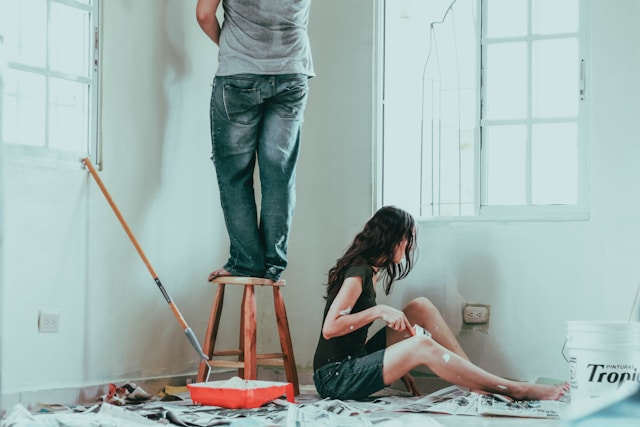Renovating your home offers more than just cosmetic upgrades. While the appearance of your property is important, making thoughtful changes can improve daily comfort and increase the market value of your home while reducing your environmental impact.
Here are eight quality-of-life, sustainable renovations that can increase your resale value.
Install solar panels
Going solar is one of the most impactful retrofits you can make to improve energy efficiency and higher property value. Solar panels allow you to use the sun to generate renewable electricity, reducing your dependence on the grid. This can reduce your electricity bill by $25,500 to $33,000 over its lifetime and reduce your carbon footprint.
To further reduce your carbon footprint, install solar-powered gadgets around your home, such as fence post lights, decorative pool fountains or blinds. No matter how small, a solar installation is sure to increase the value of your home. The best part is that solar power can be used anywhere—even in Alaska.
Upgrade to energy-efficient windows
Outdated single-pane windows let valuable heating and cooling air leak out, increasing your energy bills and carbon footprint. Replacing them with Energy Star-certified double- or triple-pane windows can reduce your home’s energy use by 7%-15%, saving you money on utility bills and reducing your environmental impact.
What’s more, new windows can provide a return on investment (ROI) of up to 85% on your home’s resale value. You may even be eligible for rebates and incentives from your local government or utility company for having energy-efficient windows.
Upgrade to efficient HVAC
Heating and cooling can account for 50% of a home’s total energy consumption. Upgrading to a high-efficiency HVAC system, such as a heat pump or an Energy Star-rated air conditioning unit in cold climates, can reduce these costs by 10%-30%. This can reduce environmental impact while increasing the value of your home.
While installing an energy-efficient HVAC system can cost nearly $12,500, you can expect a return on investment of around 60%. New owners will be willing to pay more because they won’t have to replace inefficient equipment.
Repave your driveway
Traditional asphalt or concrete driveways are carbon-intensive roads that create an impermeable surface that prevents proper drainage, creating water pollution. Choose a permeable surface such as porous concrete or permeable pavers. These materials allow water to filter, reduce runoff and recharge groundwater.
For even more benefits, consider using eco-friendly paving materials in your driveways and outdoor spaces. Asphalt pavement is a popular sustainable option due to its long life and 100% recyclability, significantly reducing waste in the long term. Choosing high-quality asphalt will save you significant costs, as cheaper, lower-quality asphalt may require frequent repairs. It looks good to potential buyers, too.
Choose environmentally friendly floors and roofs
Hardwood, bamboo and cork flooring are becoming increasingly popular due to their natural, sustainable properties. These materials are renewable, biodegradable and often recyclable. They also tend to be very durable and don’t require frequent replacement. Buyers love the warm, natural beauty they add to any property.
Go the extra mile and replace your roof with energy-efficient materials. Installations such as metal roofs with reflective coatings can reduce indoor temperatures by reflecting sunlight. Green roofs are the perfect solution for urban properties with insufficient garden space. In addition to providing space to grow your favorite herbs, fruits, and flowers, they also help reduce stormwater runoff while providing insulation for your home. These roofs reduce cooling costs during the warmer months, lowering your energy needs and benefiting the planet.
While roof upgrades can be costly, they offer a strong return on investment and add significant appeal to buyers interested in sustainable home features.
Energy saving appliances
Replacing old appliances with Energy Star rated options can significantly reduce electricity and water usage. Look for washers, dryers, refrigerators and ovens that have eco-friendly settings, use less electricity and qualify for rebates or tax incentives. Energy-efficient appliances improve quality of life by reducing utility costs and promoting a more sustainable lifestyle.
water saving device
Replacing old plumbing fixtures with water-saving fixtures is a simple and effective way to conserve resources. Consider low-flow shower heads, toilets and faucets that use significantly less water without compromising performance. These changes can reduce your water bill and increase your home’s resale value, as environmentally friendly plumbing solutions appeal to today’s environmentally conscious buyers.
Rainwater harvesting is a simple way to make your home greener, especially for garden irrigation. Installing rain barrels or underground tanks can reduce water bills, reduce municipal demands and provide a backup source of water.
native landscape
Landscaping with native plants is an environmentally friendly way to enhance curb appeal and directly increases the value of your home. It consumes less water, requires less chemical input, and is low maintenance, which will save you significant costs over time.
What’s more, well-designed landscaping is visually appealing. It would look good in a listing and appeal to buyers who appreciate sustainable outdoor spaces.
Get the benefits of an eco-friendly upgrade
Making these quality-of-life, eco-friendly renovations can increase your home’s market value and help create a healthier, more sustainable environment.
 About the author
About the author
Oscar Collins is the editor-in-chief of Modded and writes about health and fitness. Follow him on Twitter @TMModded Get regular updates on his work and subscribe to Modded Minute to learn more!

